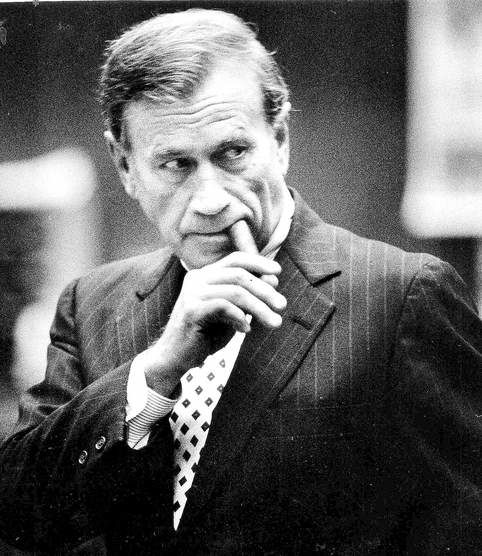James Neal, 81, leading trial lawyer who won case in Watergate scandal
Published 5:00 am Monday, October 25, 2010

- James Neal, a formidable lawyer who won noteworthy victories on both sides of the courtroom — as a prosecutor he sent Teamsters leader Jimmy Hoffa and top Watergate figures to prison, and as a defense attorney he saved film director John Landis and Ford Motor Co. from serious criminal charges — died Thursday in Nashville. He was 81.
James F. Neal, one of the nation’s leading trial lawyers, who sent Teamsters chief Jimmy Hoffa to prison and later won convictions against top officials of the Nixon administration in the Watergate cover-up trial, died Oct. 21 of esophageal cancer at a hospital in Nashville. He was 81.
Neal, who mesmerized courtrooms with his courtly manner and Tennessee drawl, was at the center of many renowned trials, beginning in the early 1960s when Attorney General Robert F. Kennedy chose him to lead a Justice Department investigation of Hoffa for corruption.
Trending
As a special prosecutor in the 1970s, Neal confronted the Nixon White House in the Watergate cover-up trial, resulting in the convictions of former Attorney General John N. Mitchell and two of President Richard M. Nixon’s closest advisers, John D. Ehrlichman and H.R. Haldeman.
Later, from his base in Nashville, Neal handled prominent cases throughout the country, compiling a remarkable record of legal victories. In 1985, Fortune magazine named him one of the country’s five best trial lawyers.
He won an acquittal for Ford Motor Co. in 1980, when it was charged with reckless homicide over the design of its Pinto car. He successfully defended Louisiana Gov. Edwin Edwards in a racketeering trial in 1985.
Exxon Valdez oil spill
Neal handled the defense for Exxon after the 1989 Exxon Valdez oil spill in Alaska. He won an acquittal for Elvis Presley’s doctor, George Nichopoulos, who was charged with dispensing drugs that contributed to the singer’s death in 1977.
He defended director John Landis when he was accused of manslaughter after actor Vic Morrow and two child actors were killed in a 1982 accident while making “Twilight Zone: The Movie.”
Trending
“Jim was viewed by some as the go-to lawyer for corporations and for people in trouble,” his longtime law partner Aubrey Harwell said Friday. “He had a tremendous ability to communicate across the spectrum, rich and poor, black and white. He brought tremendous credibility with him.”
Neal was working for a Washington law firm when he joined the Justice Department in 1961 and began looking into corruption charges against Hoffa and the Teamsters union. When an initial trial ended in a hung jury, Neal led a second prosecution against the union boss for jury tampering. In the 1964 trial in Chattanooga, Tenn., Hoffa flashed obscene hand gestures at Neal under the table.
“Jimmy Hoffa once called me the most vicious prosecutor who ever lived,” Neal later said, as a matter of pride. He won the only federal conviction against Hoffa, whose prison sentence was later commuted by Nixon.
In 1973, special prosecutor Archibald Cox summoned Neal back to Washington to investigate the Watergate cover-up that led to the president’s resignation the next year.
Neal won a guilty plea from former White House counsel John W. Dean in 1973 and then took on members of Nixon’s inner circle the next year. Washington was riveted by the cover-up trial in late 1974, in which Mitchell, Ehrlichman, Haldeman and two other former White House aides were charged with conspiracy, perjury and obstruction of justice.
“The prosecutor spoke in a rich Tennessee twang, only occasionally glancing at note card reminders,” The Washington Post reported of his closing argument. “He shouted. He whispered. He glared, at times swiveling around dramatically to point at the defendants.”
“It’s no fun casting stones,” he told the jury in Judge John J. Sirica’s courtroom. “But to keep society going, stones must be cast. People must be called to account.”
On New Year’s Day 1975, the jury found Mitchell, Ehrlichman and Haldeman guilty. Neal always considered his Watergate summation his “finest hour” in the courtroom.
Football in Wyoming
James Foster Neal was born Sept. 7, 1929, near Oak Grove, Tenn., and grew up milking cows on a small family farm. He won a football scholarship to the University of Wyoming and was a running back on the Cowboys’ undefeated team in 1950.
After graduating from Wyoming, he served in the Marine Corps for two years, which he credited with giving his life discipline and direction.
He graduated first in his law school class at Nashville’s Vanderbilt University in 1957 and received a master’s in tax law from Georgetown University in 1960.
After his prosecution of Hoffa in 1964, Neal was a U.S. attorney in Tennessee before entering private practice in 1966. He returned to Washington as a special investigator of the Abscam and Iran-Contra scandals in the 1980s, but he focused more on complicated white-collar defense cases.
“He was a popular advocate for unpopular causes,” said Washington defense lawyer Abbe Lowell, who worked with Neal on several cases. “He was one of the great trial lawyers and one of the great strategists of this century.”
One of his most controversial cases was his 1980 defense of Ford, in which he argued that the small-sized Pinto was inherently more risky than a larger car. He won the landmark case and dozens of others, though he joked that the protracted Exxon Valdez case didn’t end as well.
“I have the unhappy record of losing the biggest verdict in the history of the United States, a $5 billion punitive damage award,” he said. (In 2008, the Supreme Court ruled the amount was excessive.)
Neal’s marriages to Ellen Julie Neal and Victoria Jackson ended in divorce.
Survivors include his wife of 20 years, Dianne Ferrell Neal, of Nashville; two children from his first marriage, James F. Neal Jr. and Julie Neal; a stepdaughter, Sarah Nickoloff; two sisters; and five grandchildren.
Over the years, Neal did legal work for many country-western entertainers. In the early 1980s, one of his clients, Johnny Cash, invited the outgoing Neal, who never shied from a camera, to appear as a lawyer in the television movie “Murder in Coweta County.”
“I get a kick every time it’s run,” he once said.






